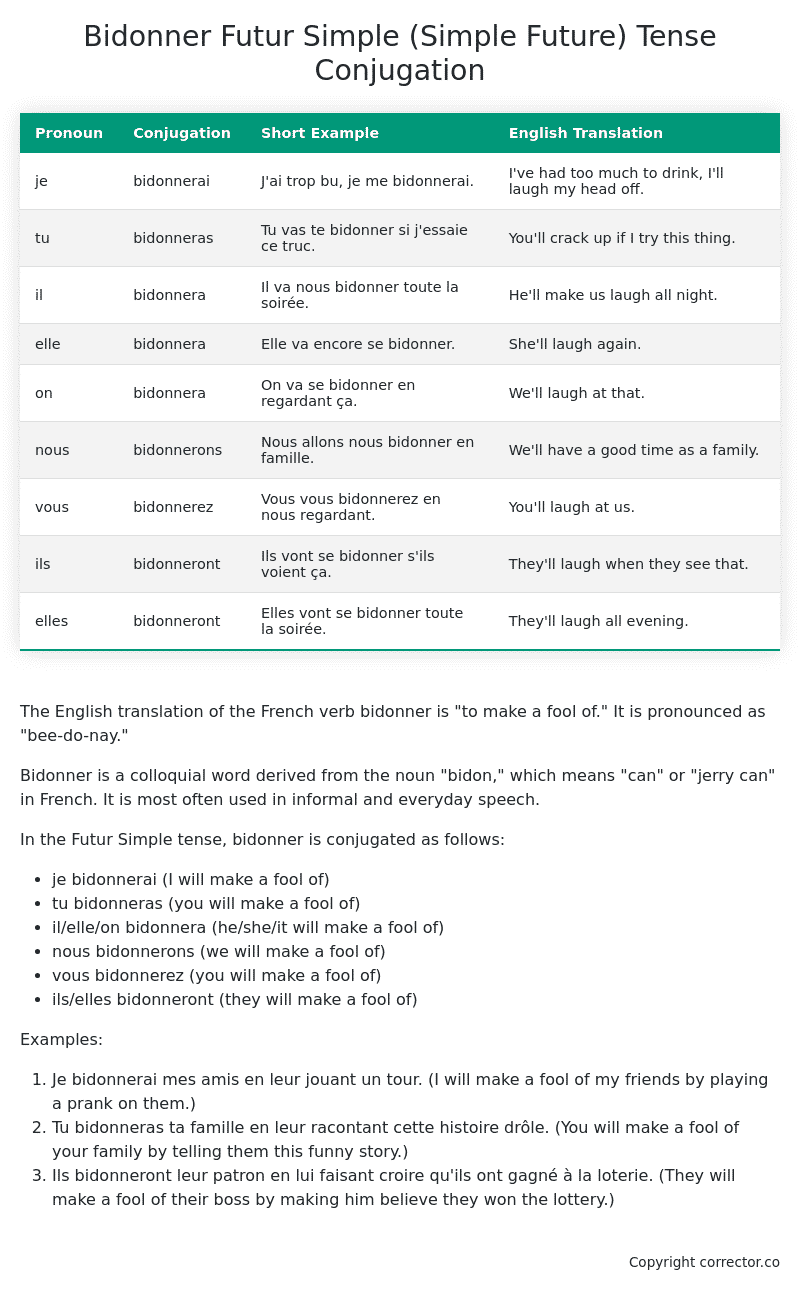Futur Simple (Simple Future) Tense Conjugation of the French Verb bidonner
Introduction to the verb bidonner
The English translation of the French verb bidonner is “to make a fool of.” It is pronounced as “bee-do-nay.”
Bidonner is a colloquial word derived from the noun “bidon,” which means “can” or “jerry can” in French. It is most often used in informal and everyday speech.
In the Futur Simple tense, bidonner is conjugated as follows:
- je bidonnerai (I will make a fool of)
- tu bidonneras (you will make a fool of)
- il/elle/on bidonnera (he/she/it will make a fool of)
- nous bidonnerons (we will make a fool of)
- vous bidonnerez (you will make a fool of)
- ils/elles bidonneront (they will make a fool of)
Examples:
- Je bidonnerai mes amis en leur jouant un tour. (I will make a fool of my friends by playing a prank on them.)
- Tu bidonneras ta famille en leur racontant cette histoire drôle. (You will make a fool of your family by telling them this funny story.)
- Ils bidonneront leur patron en lui faisant croire qu’ils ont gagné à la loterie. (They will make a fool of their boss by making him believe they won the lottery.)
Table of the Futur Simple (Simple Future) Tense Conjugation of bidonner
| Pronoun | Conjugation | Short Example | English Translation |
|---|---|---|---|
| je | bidonnerai | J’ai trop bu, je me bidonnerai. | I’ve had too much to drink, I’ll laugh my head off. |
| tu | bidonneras | Tu vas te bidonner si j’essaie ce truc. | You’ll crack up if I try this thing. |
| il | bidonnera | Il va nous bidonner toute la soirée. | He’ll make us laugh all night. |
| elle | bidonnera | Elle va encore se bidonner. | She’ll laugh again. |
| on | bidonnera | On va se bidonner en regardant ça. | We’ll laugh at that. |
| nous | bidonnerons | Nous allons nous bidonner en famille. | We’ll have a good time as a family. |
| vous | bidonnerez | Vous vous bidonnerez en nous regardant. | You’ll laugh at us. |
| ils | bidonneront | Ils vont se bidonner s’ils voient ça. | They’ll laugh when they see that. |
| elles | bidonneront | Elles vont se bidonner toute la soirée. | They’ll laugh all evening. |
Other Conjugations for Bidonner.
Le Present (Present Tense) Conjugation of the French Verb bidonner
Imparfait (Imperfect) Tense Conjugation of the French Verb bidonner
Passé Simple (Simple Past) Tense Conjugation of the French Verb bidonner
Passé Composé (Present Perfect) Tense Conjugation of the French Verb bidonner
Futur Simple (Simple Future) Tense Conjugation of the French Verb bidonner (this article)
Futur Proche (Near Future) Tense Conjugation of the French Verb bidonner
Plus-que-parfait (Pluperfect) Tense Conjugation of the French Verb bidonner
Passé Antérieur (Past Anterior) Tense Conjugation of the French Verb bidonner
Futur Antérieur (Future Anterior) Tense Conjugation of the French Verb bidonner
Subjonctif Présent (Subjunctive Present) Tense Conjugation of the French Verb bidonner
Subjonctif Passé (Subjunctive Past) Tense Conjugation of the French Verb bidonner
Subjonctif Imparfait (Subjunctive Imperfect) Tense Conjugation of the French Verb bidonner
Subjonctif Plus-que-parfait (Subjunctive Pluperfect) Tense Conjugation of the French Verb bidonner
Conditionnel Présent (Conditional Present) Tense Conjugation of the French Verb bidonner
Conditionnel Passé (Conditional Past) Tense Conjugation of the French Verb bidonner
L’impératif Présent (Imperative Present) Tense Conjugation of the French Verb bidonner
L’infinitif Présent (Infinitive Present) Tense Conjugation of the French Verb bidonner
Struggling with French verbs or the language in general? Why not use our free French Grammar Checker – no registration required!
Get a FREE Download Study Sheet of this Conjugation 🔥
Simply right click the image below, click “save image” and get your free reference for the bidonner Futur Simple tense conjugation!

Bidonner – About the French Futur Simple (Simple Future) Tense
Formation of Futur Simple
For regular -er verbs (e.g., parler – to speak)
For regular -ir verbs (e.g., finir – to finish)
For regular -re verbs (e.g., vendre – to sell)
Common Everyday Usage Patterns
Conditional Statements
Interactions with Other Tenses
Futur Antérieur
Conditional
Present
Summary
I hope you enjoyed this article on the verb bidonner. Still in a learning mood? Check out another TOTALLY random French verb conjugation!


